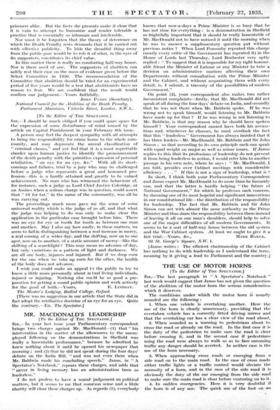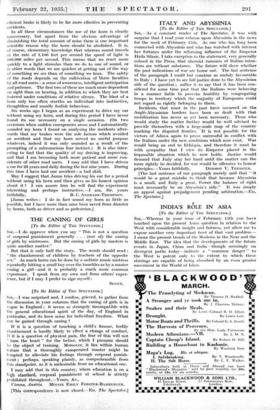THE USE OF MOTOR HORNS
[To the Editor of THE SPECTATOR.] SIR,—The last paragraph in "A Spectator's Notebook last week would suggest that Janus has not given the question of the abolition of the motor horn the serious consideration which it deserves.
The conditions under which the motor horn is usually sounded are the following :
1. When one vehicle is overtaking another. Here - the use of the horn is clearly unnecessary, providing that the overtaken vehicle has -a correctly fitted driving mirror and that the overtaking car has a clear view of the road ahead,
2. When sounded as a warning to pedestrians about to cross the road or already on the road. In the first case it is the duty of the pedestrian to make sure the road is clear before crossing it, and in the second case if pedestrians using the road were always to walk so as to face oncoming traffic any danger should be averted. In neither case is the use of the horn necessary.
3. When approaching cross roads or emerging from a side road on to the main road. In the case of cross roads either traffic lights or a traffic control would obviate the necessity of a horn, and in the case of the side road it is obviously the duty of the car emerging from the side road to make sure the main road is clear before venturing on to it. 4. In sudden einergeneies. Here it is very doubtful if the horn is of any use -The quick use-of the foot on an
efficient brake is likely to be far more effective in preventing accidents.
In all these circumstances the use of the horn is clearly unnecessary, but apart from the obvious advantage of diminishing the total amount of noise there is one important scientific reason why the horn .should be abolished. It is, of course, elementary knowledge that whereas sound travels at the rate of 1,100 feet per second the speed of light is 186,000 miles per second. This means that we react more quickly to a light stimulus than we do to one of sound, or in other words that we are quicker at getting out of the way of something we see than of something we hear. The safety of the roads depends on the cultivation of three faculties by all road users—a sense of awareness, intelligent anticipation and patience. The first two of these are much more dependent on sight than on hearing, in addition to which they are best fostered under conditions of relative silence. The blast of a horn only too often startles an individual into instinctive, thoughtless and usually foolish behaviour.
Six weeks ago I began as an experiment to drive my car without using my horn, and during this period I have never found its use necessary on a single occasion. (On two occasions when sudden emergencies arose and I automatically sounded my horn I found on analysing the incidents after- wards that my brakes were the sole factors which avoided an accident and that my horn served no useful purpose whatever, indeed it was only sounded as a result of the prompting of a subconscious fear instinct.) It is also inter- esting to find that the quality of my driving is improving, and that I am becoming both more patient and more con- siderate of other road users. I may add that I have driven a car for 20 years and daily during the last nine years. During this time I have had one accident—a bad skid.
May I suggest that Janus tries driving his car for a period without using his horn and then gives us his honest opinion about it ? I can assure him he will find the experiment interesting and perhaps instructive.—! am, Sir, yours
faithfully, B. C. ANDRADE-THOMPSON. [Janus writes : I do in fact sound my horn as little as possible, but I have more than once been saved from disaster by horns, both as driver and as pedestrian.]



















































 Previous page
Previous page